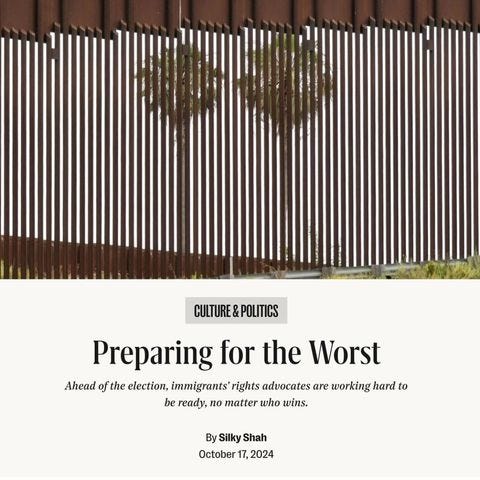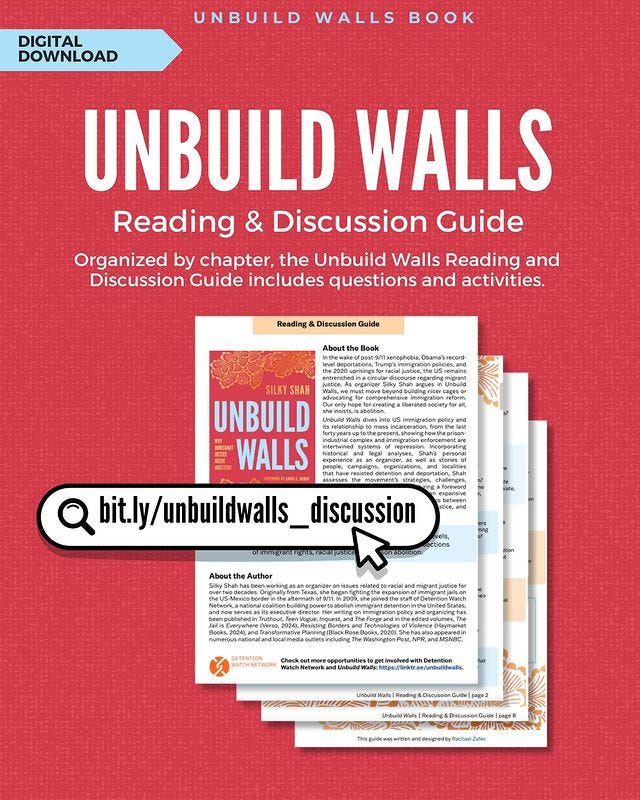“So much of this work is asking, what is the world we want to live in? What is the world we want to see?”
Silky Shah on abolitionist dreaming, immigrant justice, and organizing post-election
Near the end of our conversation with author Silky Shah, she reflected on something now feels portentous, publishing this newsletter two days after the U.S. election. Speaking (back in September), she shared her discouragement of “seeing how much the Dems have moved that much further to the right” when it comes to immigration policy. Looking at the then upcoming election, Shah noted the overdue work that political parties had to do when it came to meaningful immigration reform.
As we close out this interview, we recognize that this is a difficult time for many members of La Cuenta’s community. We share Shah’s words as guidance for dreaming and building better worlds together.
RITA KAMANI-RENEDO: So much of your book is about dreaming beyond the limits of what a single political moment has offered us. Where do you see shifts in discourse and imagination happening?
SILKY SHAH: My approach to this is just super analytical and driven by strategy. So even if, for so many people, abolition is the dreaming part, I am thinking about what tools are going to help us get to that place where we can actually have the ability to do. But it is true so much of this work is asking, what is the world we want to live in? What is the world we want to see?
RKR: As individuals and as a collective, how to do we do this kind of work? Whose responsibility is that? Where can that happen?
I think it happens in a lot of different ways. The last part of the book is called “Making Abolition” and the idea is not just imagining we can actually start to do these things in small ways and big ways. Sometimes a lot of those small things together end up in like a big change, right? For me, a lot of what I'm trying to do is kind of make the case that the investment and local organizing and local infrastructure for this work is so, so essential. Sadly, a lot of the investment has been on this sort of like federal lobbying strategy around immigration that has hurt so many things, but it's actually where we've seen people make shifts. You get the ability to have undocumented people have driver's licenses in California, and now all of a sudden people aren't being targeted in traffic stops, and that isn't putting them in the deportation pipeline in the same way.
There's all these layers of what can happen if you kind of change one thing. “Making Abolition” isn't just about ending a detention contract. It's about making sure people have public benefits, making sure people can thrive and take care of themselves and take care of their family.
“Making Abolition” is about making sure people have public benefits, making sure people can thrive and take care of themselves and take care of their family.
One thing I've been dreaming about probably more so lately is that ability for people to return home after being deported. I think about what that does to break down the idea of the border and the ability to say, "Actually, no, there is possibility there, and people have been able to return and have been able to be reunited with their family."
I think it's just not accepting the things that we're told--that the system has to be this way: whether it's having language justice, having the ability for people to communicate and expanding that ability in a small meeting that we're having on strategy, or in a know-your-rights training, or if it's something bigger, like a state bill passes, or having one person come home from being deported and being reunited with their kids.
I think all those things for me are starting to get us there, and I think a lot of what I'm trying to do in the book and what I think abolition teaches us is that sometimes we can get caught up with this individual case and this sort of like negotiation with the system: how do we change a system to help this one individual case? I think abolition asks us to look at the whole system and see how we start to shift it so that it can apply to lots of people as opposed to just one person.
Abolition asks us to look at the whole system and see how we start to shift it so that it can apply to lots of people as opposed to just one person.
ANTERO GARCIA: What’s the response to your book been like?
SS: I was expecting some pushback or some sort of critique. That hasn't happened yet. I'm sure it will happen at some point, and I'm here for it, but it's been overwhelmingly positive. I think one thing that's been really special about doing the book tour and being with other people talking about the book is that it's resonating with people a lot. This includes reflecting their own experiences of being in this movement and trying to do this work, as well as feeling this sort of intensity of the good immigrant versus bad immigrant frame on them constantly in this public safety narrative. It's like, "No, we don't have to accept this. We don't have to do things this way."
The challenge I'm struggling with is seeing how much the Dems have moved that much further to the right. Some of this is because of a lack of political education and also because of a bit of cynicism and this desire to get to that big legalization bill or something.
They're embracing the border security frame.
So again, we're in that dichotomy. The process with the book has been beautiful in so many ways, and I'm so glad it's a resource for our communities. I hope it helps with the work, but I just know that we actually have a lot of our work cut out for us. It felt like 2020 was a moment where, we had an opening to bring the sort of more mainstream parts of the movement into this idea of abolition or into this idea of like actually detention shouldn't exist, and we got a lot of them there. It was kind of incredible. It feels like the backlash is not just from the Democrats, it's actually from the movement itself, and I think that's been a little hard to reckon with.
And yeah, I mean, I think especially with just sort of seeing how the election stuff has been shifting, you know, from my perspective, regardless of what's being said or how things are being approached, like we actually are required to take some agency and power and say, "No, we don't want things this way," and I think if Harris were to come into office, I think it'll be a challenge, but I think it's the time to push for those really bolder forms and see what we can get done and really kind of hold the line as much as possible, and then I think if Trump were to come into office, which is absolutely terrifying, I think it goes back to that like how do we protect our communities and do everything we possibly can.
It feels like the backlash is not just from the Democrats, it's actually from the movement itself, and I think that's been a little hard to reckon with.
RKR: The timing for this book is striking!
SS: It's a bizarre time to have a book come out because it's just like everything that's happening, the migrant crime wave, the fear-mongering on this, the border security stuff, all of it feels just like, "Oh, this is what I just wrote about and it's just here." I'm glad to be able to offer something at least right now.
Propina
We want to share deep gratitude to Silky Shah for offering her time and expertise with us. Please check out her recent book, Unbuild Walls.
We also want to recognize that the results of this reelection reflect work we need to do—now and in the coming months—to protect and care for one another. If you have words or ideas you’d like to share with La Cuenta’s community, please get in touch.
We’ll see you next week.








